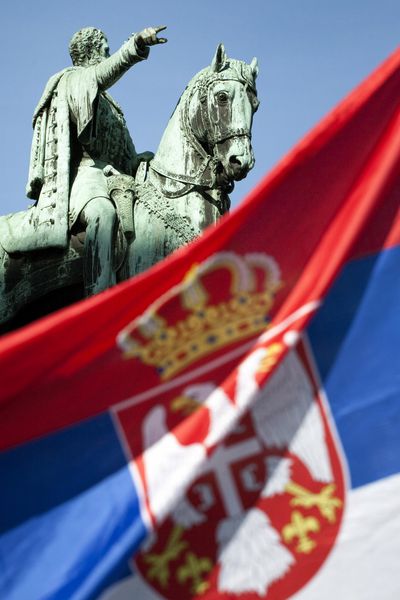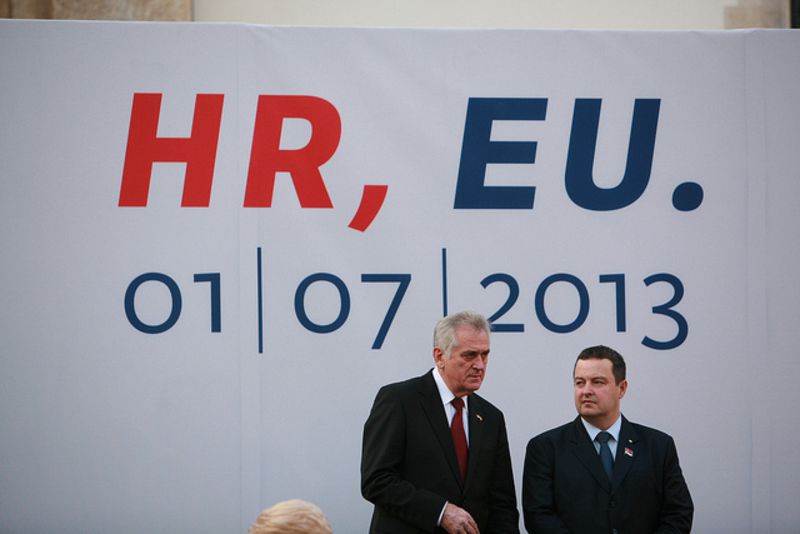Serbia Begins a Diplomatic Offensive against Croatia
Adelina Marini, December 9, 2013
 The noose around Prime Minister Zoran Milanovic's neck is beginning to tighten up more and more precisely especially around the second anniversary of his government. In the middle of his term, Mr Milanovic has to fight not only the severe economic problems in the country and defend the minority's rights, but also a new challenge from Serbia. Last week, the Serbian foreign ministry sent to all countries where it has diplomatic representations, a document with "accusations" against Croatia of violations of the rights of the Serb minority in the country. The list with the Zagreb's violations consists of 14 points, to which the Croatian government has not yet responded officially.
The noose around Prime Minister Zoran Milanovic's neck is beginning to tighten up more and more precisely especially around the second anniversary of his government. In the middle of his term, Mr Milanovic has to fight not only the severe economic problems in the country and defend the minority's rights, but also a new challenge from Serbia. Last week, the Serbian foreign ministry sent to all countries where it has diplomatic representations, a document with "accusations" against Croatia of violations of the rights of the Serb minority in the country. The list with the Zagreb's violations consists of 14 points, to which the Croatian government has not yet responded officially.
According to Belgrade, the anti-Serb incidents have increased recently and have even turned into an anti-Serb campaign, while condemnation on behalf of the authorities is "sporadic". This, the Serbian foreign ministry believes, leads to the lack of a large scale condemnation in the public domain of such incidents. An euinside source in the Croatian foreign ministry confirmed the already expressed official Croatian position that those were isolated cases and cannot be considered a campaign against the Serb minority. The greatest increase of the incidents is related to the introduction of bilingual inscriptions, which caused significant tensions in Vukovar and led to a division into a Vukovar-Croatia and a non-Vukovar-Croatia right on the anniversary of the devastation of the city by the then Yugoslav People's Army (JNA). The rebellion against the Cyrillic inscriptions on public buildings in Vukovar has led to individual cases of destruction of inscriptions in Cyrillic alphabet in other towns and cities in Croatia, where bilingual inscriptions had long been introduced.
Zagreb believes, however, that the Serb accusations are not justified because the government could have postponed the introduction of the inscriptions, but it, on the contrary, insists on fulfilling its obligations. Moreover, Zagreb expects official support from Belgrade in these efforts. To the defence of the Croatian efforts are also several important dates from the past. In 1997, the Croatian government ratified the convention on protection of national minorities as well as the European provisions for regional and minority languages. In 2002 a constitutional law was adopted on the rights of national minorities. In addition, there is a law in the country that allows minorities to study in their mother tongue and writing. On national TV and radio there are also programmes in the languages of the country's minorities and the council on national minorities meets regularly and often reviews whether the provisions related to public media are implemented.
euinside's source recalls in this context that the Croatian minority in Serbia does not have such rights. For example, in Croatia, minorities have representatives in parliament. They are eight, three of whom are Serb MPs. Something that has not happened yet in Serbia, the source said. Croatian kids have still not received textbooks in Croatian language, which was mentioned as a problem during the first official visit by President Ivo Josipovic in Serbia this autumn.
In Belgrade's "charge list" it is also pointed out that the Croatian state prevents some 50 000 Serbs with a refugee status to return to Croatia and their properties to be restored. According to data by the Croatian foreign ministry, so far 133 000 members of minorities have returned to Croatia, 93 969 of whom are of Serb nationality. The rest are from Bosnia and Herzegovina and the Croatian Danube region. From the beginning of the war until now Croatia has invested in recovery of properties 5.5 billion euros from its budget. This money was spent on restoration of destructed homes, infrastructure, removal of landmines and affect some 150 000 homes and properties. 120 million euros are planned to be spent both from the Croatian budget and the EU funds, 90% of which will be spent on securing housing for 3 541 families who have housing rights in their capacity of refugees.
On Belgrade's list are also most of the unresolved bilateral problems that have been discussed in visibly good spirit during Croatia's head of state's visit in Serbia in October. A visit that was impossible only a year ago because of nationalistic and incorrect statements on behalf of the then newly elected President of Serbia Tomislav Nikolic. One of his remarks that caused freezing of the Serb-Croatian relations was aimed precisely at Vukovar, which he called a "Serb city". Ivo Josipovic's condition to formally meet his Serb counterpart was Mr Nikolic to apologise. There was no formal apology, but nonetheless the visit happened, thus the two countries scored good marks before Brussels in terms of bilateral relations. This was reflected in the progress report on Serbia which the European Commission presented in October. This year, thanks to all these efforts, Serbia turned from the biggest troublemaker in the region to a champion of European integration in the Western Balkans.
Among the unresolved bilateral issues on the list is also the establishment of the fate of those who disappeared and were killed during the war between the two countries in the beginning of the 1990s. An issue which is a major one for Croatia in all bilateral contacts. For its part, Zagreb believes that it is his initiative to solve some of the most important issues like the one about those who disappeared during th war, the prosecution and conviction of accused of war crimes and also the return of arts. For Croatia, however, the fate of the disappeared is of key importance. The problem with payment of pensions is also a major one for Zagreb. 40 000 people in Serbia receive pensions from the Croatian budget. Croatia disagrees with the statement that pensions are not paid and recalls that the only period of interruption of payments was during the war.
Moreover, our source adds, this issue is currently discussed in the context a bilateral agreement for social security. This, though, is a bilateral issue. In the beginning of the year, the foreign minsters of the two countries - Vesna Pusic and Ivan Mrkic - outlined three groups of issues to be resolved between the two counties. The first is the issue of the consequences from the war, mainly the disappeared persons; the second is Croatia's exit from CEFTA (the Central European free trade area) and its entry into the single market; and the third group is cooperation in the European integration for which Croatia established a special centre which shares documents and experience in a language that is close to everyone in the region, except Albania.
On its list of "accusations" Serbia has included the issue of the behaviour of football fans and hooligans during sports events. This year there were two football events that took a political dimension because they were the first major clash between Serbia and Croatia on an international football terrain. The game between the two countries in Zagreb took place with severe security measures and was followed closely by the entire international community and all the media in the region. Similar was the organisation of the match in Belgrade. Nonetheless, there were incidents. It is important to note how Croatia treats violations of bon ton. During the decisive game with Iceland, with the victory of which Croatia qualified for the world cup championship in Brazil, one of the Croatian football stars Josip  Simunic shouted in the end of the game in a microphone before the full Maksimir stadium "ready for homeland", a solute that is considered fascist in Croatia.
Simunic shouted in the end of the game in a microphone before the full Maksimir stadium "ready for homeland", a solute that is considered fascist in Croatia.
The player was punished for several games and the incident caused sharp debates in the Croatian public domain, most of which condemned such a behaviour. This cast a shadow on the victory in the game. Croatia says in its defence that there is no country in the world immune to such incidents, but said such problems must be solved. Croatia, too, has in its archive inappropriate slogans from the Serbian stands and is ready to quote them if necessary.
Serbia's diplomatic offensive caught Zagreb by surprise. Belgrade had already protested orally through its embassy in the Croatian capital against the incidents and insisted the rights of minorities to be respected. On that occasion the Croatian news agency Hina reported that there were meetings between the two parties during which Serbia expressed concern. All this has been unfolding against the backdrop of the successful completion of collection of signatures for another referendum. This time on the introduction of Cyrillic inscriptions in regions where there are minorities. 650 000 signatures have been collected. However, the preparation of constitutional amendments is in a very advanced stage that will practically ban referenda on issues that affect the rights of minorities.
On Friday, the leader of the biggest opposition party in Croatia, the Croatian Democratic Union (HDZ), Tomislav Karamarko made a U-turn in his position on the matter and said that it was not the right time for such a referendum. He admitted he signed for the voting because he only wanted to show his disagreement with Zoran Milanovic's government. In a series of interviews in the weekend Mr Karamarko accused the cabinet for the growing tensions in Vukovar, but said he would support the constitutional amendments. Serbia, for its part, expects to start accession negotiations with the EU, which emerge as the toughest in the enlargement history not only because of the enlargement fatigue in the EU, but also because of the perspective the negotiations to take place under changed conditions, like for instance restored visa regime. This could be one of the reasons behind the surprising diplomatic move by Belgrade. Whatever the other reasons, though, the EU has long stopped to believe in tears, but in reforms. Yet, reforms that have a long expiry date.
 Kolinda Grabar-Kitarovic | © KGK
Kolinda Grabar-Kitarovic | © KGK Jozo Rados | © European Parliament
Jozo Rados | © European Parliament Aleksandar Vucic, Andrej Plenkovic | © Vlada RH
Aleksandar Vucic, Andrej Plenkovic | © Vlada RH Bakir Izetbegovic, Andrej Plenkovic | © Council of the EU
Bakir Izetbegovic, Andrej Plenkovic | © Council of the EU Aleksandar Vucic, Recep Tayyip Erdogan | © Serbian Presidency
Aleksandar Vucic, Recep Tayyip Erdogan | © Serbian Presidency Jean-Claude Juncker, Zoran Zaev | © European Commission
Jean-Claude Juncker, Zoran Zaev | © European Commission